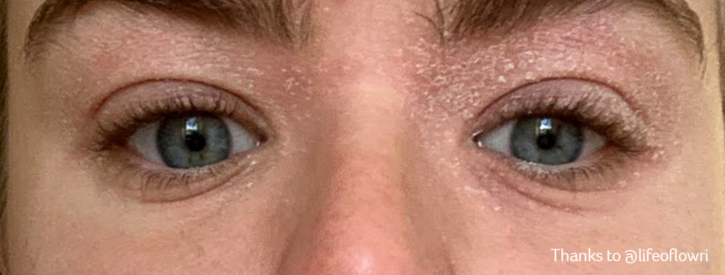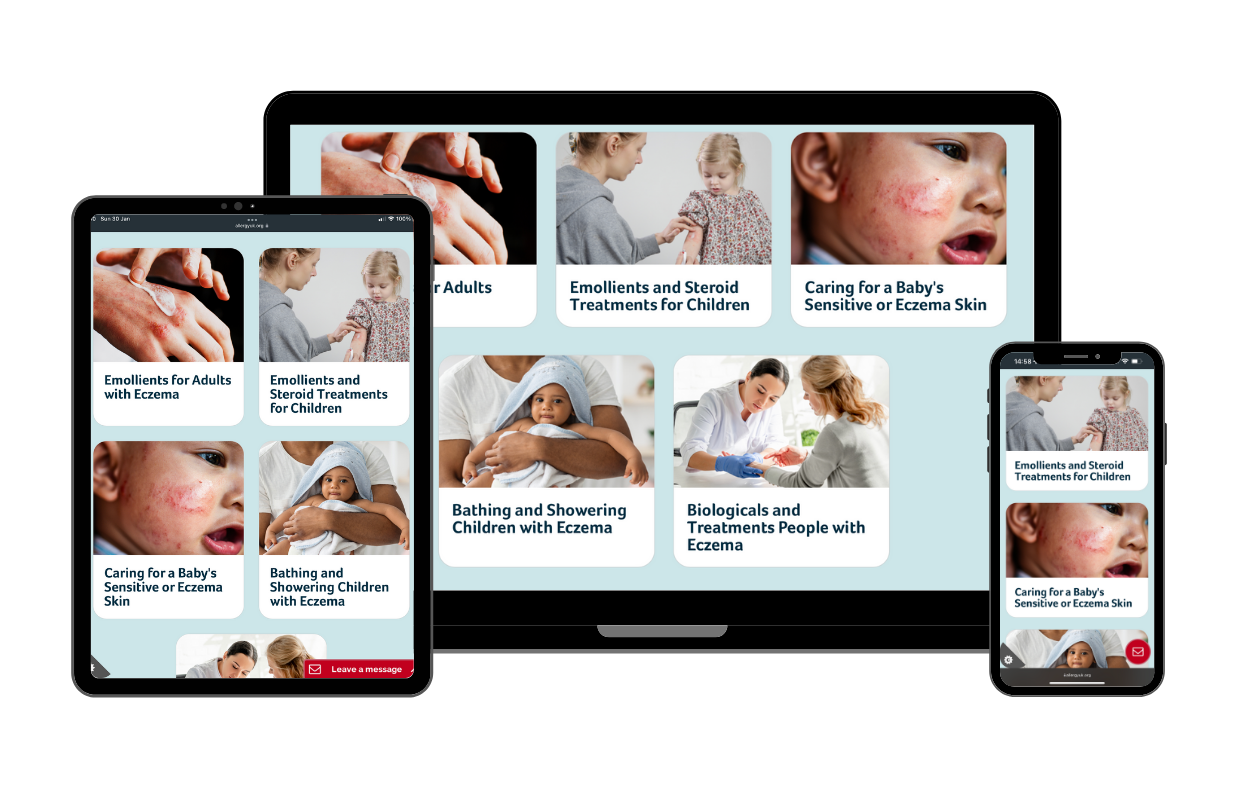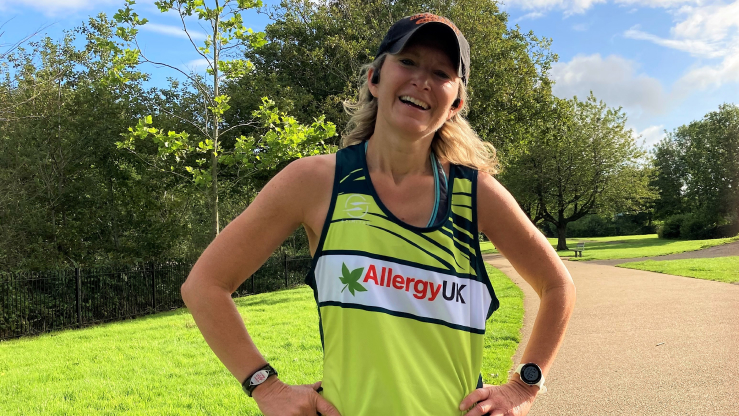Skin to Skin
Allergy UK have developed this in depth booklet to help those living with or caring for a child living with eczema.
 Skin Allergy | Allergy UK | National Charity
Skin Allergy | Allergy UK | National Charity
#itstimetotakeallergyseriously
For the second phase of our campaign, we wanted to encourage people to take a closer look to truly see and understand the truth behind living with allergic skin conditions such as atopic dermatitis.
There’s no hiding a life with eczema, and 1 in 10 adults are living with this distressing condition. If you know someone with eczema, you might have noticed their cracked, dry, inflamed skin, or questioned their itching. But did you ever consider their pain? This, for them, cuts deeper than only the scars on their skin. The looks, the judgement, and the fear from others, can bring on feelings of shame and isolation.
We launched our ‘It’s Time to Take Allergy Seriously’ campaign on the psychological impact and isolation that comes with having an allergy. This is especially true for those living with atopic dermatitis, a skin condition that can be both physically and psychologically debilitating.
Atopic dermatitis, also commonly known as eczema, is often trivialised as ‘just a skin condition’, but in reality, it can be anything but. Eczema affects 1 in 5 children and 1 in 10 adults in the UK but still remains misunderstood and stigmatised. While there’s often no hiding dry, itchy, inflamed skin, the real story may be happening beneath the surface. This often very visible condition, affecting areas such as the face, neck and hands, can have invisible impacts that cut deeper. Living with a long-term skin condition can take an emotional toll – feeling powerless with a new flare-up, exhausted with the management of symptoms and isolated because of the judgement of others.
Beyond physical discomfort, living with atopic eczema can have a significant impact on an individual’s mental health. The visible symptoms of eczema can make many feel self-conscious about their appearance, making it challenging to socialise and form relationships, leading to isolation and loneliness. A hallmark symptom of eczema is relentless itchiness that can lead to fatigue, irritability, and difficulty sleeping, further affecting one’s mental health.
82% of respondents said their atopic dermatitis affected their mood
Over 70% of respondents said they felt depressed
It can have a significant impact on a person’s self-esteem, with 73% of respondents reporting difficulties
58% said that it impacts on their personal relationships
7 in 10 respondents said that their sleeping habits were affected by the condition
73% of respondents stated that their social life is impacted by the condition, with 6 in 10 stating that it made them want to stay indoors.
Despite how prevalent atopic dermatitis is in the UK, there are many misconceptions that surround eczema: it’s contagious, just a bit of dry skin, you’ll grow out of it. The list is endless. If you live with atopic eczema, you’ve heard them all. During our conversations to raise awareness of the truth behind eczema, we will dispel some of the most widely-believed and deep-rooted misconceptions. These include;
Debunking common myths and misconceptions about eczema
Beauty is not skin deep. Having eczema doesn’t define you. Society and social media have portrayed an often-narrow definition of what’s considered beautiful, with filtered images and face tuning to hide dry skin, acne, pores and fine lines. Behind the perfect filtered portrait is real, beautiful eczema skin.
Allergy UK have developed this in depth booklet to help those living with or caring for a child living with eczema.

Eczema is often seen as ‘just a skin condition’, but when you are living with eczema it can impact on all aspects of your daily life, affecting your physical, social health and general well-being, as well as your mental health.

The following videos have been developed by Allergy UK to help you understand more about atopic eczema, emollient therapies, steroid treatments and how they can help in controlling the symptoms of eczema in both adults and children.

Eczema can affect any area of the body in adulthood, commonly affecting areas of skin that bend or crease (for example wrists, inside elbows and behind knees) and generally all areas of skin on the trunk and limbs.
We would like to ask you to please consider supporting Allergy UK’s ‘It’s Time Campaign’ this spring. During the coming months, Allergy UK will be focusing on allergic skin conditions in recognition of the fact that 1 in 10 adults and 1 in 5 children are living a skin allergy.
Allergy UK continues to look for new ways to improve the quality of life for those living with allergy, throughout the UK. We do this through our Helpline, Dietitian Service, Translation Cards, Allergy Alerts, Allergy UK Approved Products and Product Endorsement Schemes.
However, we want to further develop our offering, to better address the unmet needs of those who use our service and live with skin allergies.
Timely diagnosis of severe eczema and appropriate referral to specialists is vital for optimal patient care. However, evidence suggests this is not routinely managed across the country. Almost half of patients are required to see their GP or nurse between two to four times before they receive a diagnosis of eczema. Even with a diagnosis, a recent study suggests that up to 50% of patients will wait for more than a year for a treatment regime which makes their eczema manageable.
So, as part of our existing Helpline offering, we are looking to provide dedicated skin clinic appointments to operate once a week to address this need.
But we can’t do this without your help. Developing services costs money, and to provide this dedicated service will cost the charity an additional £32,000. So, we urgently need to find a way to increase our charitable donations to be able to fund this service.
Skin allergies really can affect anyone, at any age. If you or perhaps a loved one’s life has been affected by skin allergies, then you will understand why this campaign is so important to raise awareness and better support the needs of those who are unable to access the right support in a timely manner.
It doesn’t matter if it’s the cost of a cup of coffee or the cost of a plane ticket, just what you can spare. You may want to make a one-off donation or perhaps you would like to consider becoming a regular supporter of Allergy UK. Whatever you’re able to give will be channelled back into Allergy UK’s crucial services to support people living with allergic disease in the UK.
It really is time to take allergy seriously.
Thank you for your support!
It is important to Allergy UK that we can engage with all people that are affected by allergic disease
Join our mailing list



